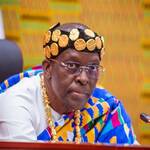For years now, the opposition National Democratic Congress (NDC), along with some individuals who present themselves as neutral, have aggressively pushed a narrative that President Nana Addo Dankwa Akufo-Addo engaged in court-packing during his presidency.
At the heart of this claim is the fact that he appointed 18 Justices to the Supreme Court during his eight-year tenure.
But what this narrative lacks is proper context — a deliberate omission intended to mislead the public.
A renewed misinformation campaign
Edudzi Kudzo Tameklo, Martin Kpebu, and others were seen repeating this well-worn narrative on TV3 Ghana.
Their aim was clear: to justify former President John Mahama’s latest — and widely criticized — nominations to the Supreme Court.
These voices continued to advance the falsehood that Akufo-Addo manipulated the judiciary, even as the facts directly contradict such claims.

How Ghanaians are being misled
Regrettably, many Ghanaians have accepted this version of events without critically engaging with the details.
The narrative has been swallowed hook, line, and sinker by those who have not paused to examine the truth.
As is the case with most propaganda, this story begins to collapse the moment the real facts are placed under the spotlight.
What President Akufo-Addo actually inherited
When President Akufo-Addo took office in January 2017, the Supreme Court had 14 Justices — thirteen regular Justices and one Chief Justice.
Over the course of his presidency, he did make 18 appointments to the Court.
However, contrary to what the NDC and their allies claim, these appointments were not arbitrary or politically motivated.
In fact, at least 13 of those appointments were replacements for Justices who had either retired or passed away — replacements that were constitutionally required and entirely appropriate.
Supreme Court numbers stayed within range
At the height of Akufo-Addo’s presidency, the number of Justices on the Supreme Court reached 17 — only three more than the number he inherited.
By the time he exited office on January 7, 2025, the Court had returned to 14 Justices, exactly the number he met in 2017.
If this is what they call court-packing, then it’s a very odd form of it — one that maintained, and ultimately returned to, the historical norm.
The retirements and vacancies the public should know
What critics conveniently ignore is the long list of retirements and exits from the Supreme Court during Akufo-Addo’s tenure.
Chief Justice Georgina Wood retired in 2017.
Over the years, several others followed suit: Justices William Atuguba, Sophia Adinyira, Julius Ansah, Anthony Benin, Yaw Appau, Nasiru Gbadegbe, Mariama Owusu, Agnes Dordzie, Jones Dotse, Clemence Honyenuga, and Avril Lovelace-Johnson all reached retirement age or exited the bench through due process. Justice Samuel Marful-Sau tragically passed away while serving, and Justices Nene Amegatcher and Nii Ashie Kotey also retired. Are critics seriously suggesting that these vacant seats should have remained unfilled?

Three Chief Justices, all constitutionally appointed
President Akufo-Addo is, in fact, the only President in Ghana’s Fourth Republic to have appointed three Chief Justices — each one replacing a predecessor who retired.
Justice Sophia Akuffo was appointed following the retirement of Chief Justice Georgina Wood.
She herself retired in 2019, after which Justice Kwasi Anin-Yeboah was appointed.
When Anin-Yeboah retired in 2023, Justice Gertrude Torkornoo was appointed.
These were not political manoeuvres but natural successions dictated by the Constitution.
Appointments were constitutional, not calculated
Therefore, citing the figure of 18 appointments in isolation — without context — is both misleading and dishonest.
These appointments were largely due to mandatory retirements, constitutional term completions, or unfortunate deaths.
The opportunity to appoint more Justices came because of vacancies, not as part of a strategy to tilt the judiciary.
Now let’s talk about Mahama
Today, President Mahama has nominated seven new Justices to the Supreme Court.
As of January 2025, the Court had 14 sitting Justices — the same number that existed at the start of Akufo-Addo’s presidency.
The glaring question then is: what has changed so dramatically to justify the appointment of seven new Justices?
How many retirements or deaths have occurred in 2025 alone to necessitate such an increase?
The truth is: there hasn’t been a wave of retirements or a mass exodus from the Court.
These are not replacements — they are additions.
These nominations represent a significant expansion of the bench without a clear constitutional necessity to do so.
Mahama contradicts his own proposal
Even more puzzling is the fact that Mahama himself once proposed that the Supreme Court be capped at 15 Justices.
It was a recommendation he made publicly, and one that reflected a reasonable desire to ensure judicial efficiency.
Now, however, his new nominations will take the number of Justices to 21 — far exceeding the very limit he once championed.
The contradiction is glaring, and the silence of those who once accused Akufo-Addo of court-packing is deafening.
So, who is really packing the Supreme Court?
The facts are clear. Under President Akufo-Addo, the number of Supreme Court Justices never exceeded 17, and by the time he left office, it had returned to 14 — the same number he inherited. Most of his appointments were made to replace Justices who had reached retirement age or passed away, in line with constitutional processes.
In contrast, President Mahama is now expanding the Supreme Court by seven new Justices, even though there have been no corresponding retirements or vacancies to warrant such an increase — even if technically not unconstitutional.
A matter of principle and integrity
This development is not just a legal matter; it is a test of principle.
President Mahama’s move contradicts his own stated beliefs and opens him up to charges of hypocrisy and political opportunism. Meanwhile, those who previously shouted about court-packing under Akufo-Addo have now fallen strangely silent, even as the Court stands to grow larger than ever before.
In the end, the facts must guide the public discourse. President Akufo-Addo did not pack the Supreme Court — he fulfilled constitutional duties necessitated by vacancies.
President Mahama’s current nominations, however, raise critical questions about motive, consistency, and the future of judicial independence in Ghana.
By Akaneweo Kabiru Abdul
- Mahama unveils Code of Ethics for appointees - 5 May 2025
- No system breach, MoMo is safe, secure- MTN - 5 May 2025
- Historic CJ Torkornoo’s reinstatement demo ends peacefully - 5 May 2025




